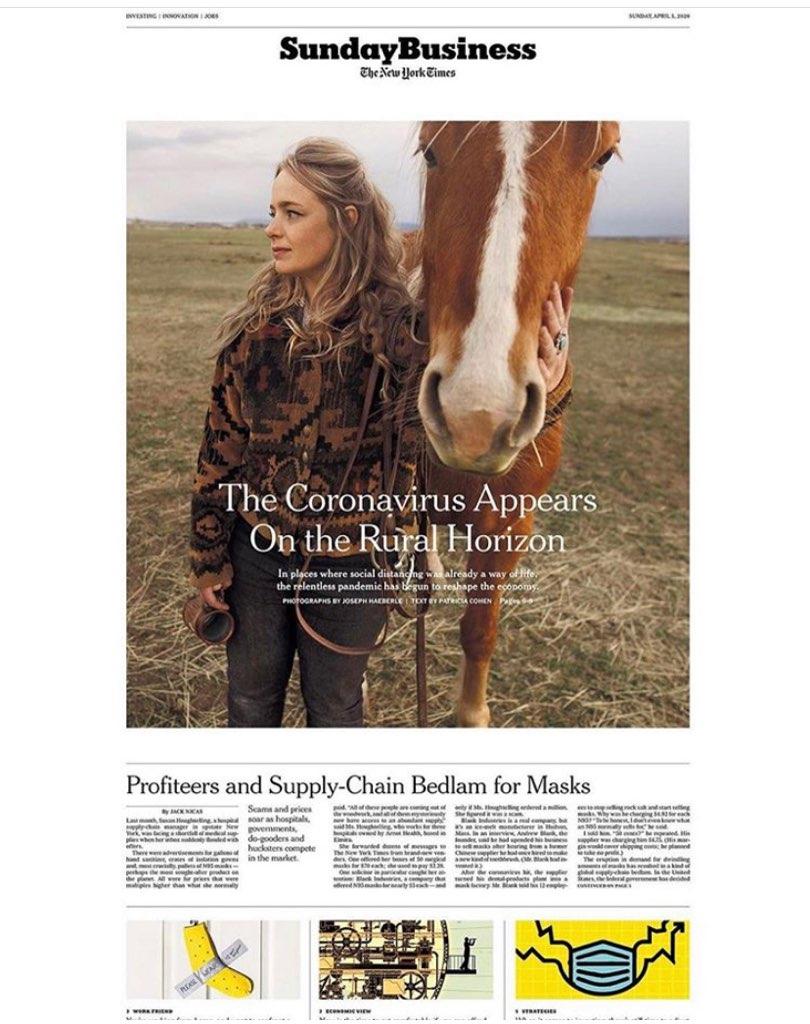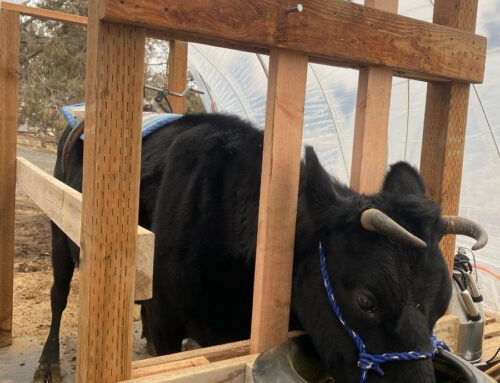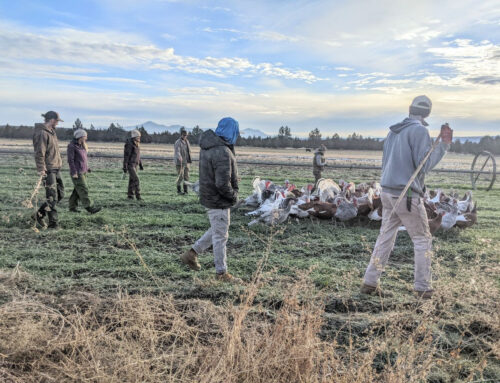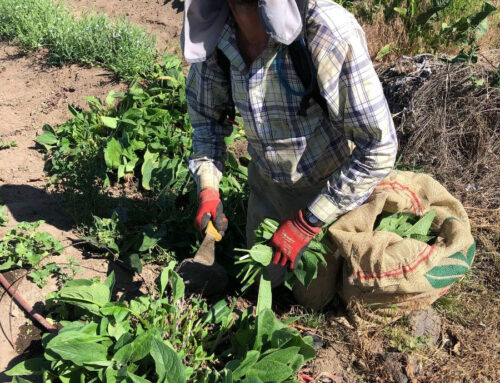Coronavirus Appears on the Rural Horizon

This morning my dear friend, Cate Havstad, from Casad Family Farms came rolling into my driveway in her diesel truck. She wanted to do a little brainstorming to respond to an article she was featured in in a Sunday April 5, 2020 New York Times article.
I’ve been struggling to articulate how I feel about COVID-19… how it has affected the farm… how rapidly changing it all has been. It was extremely helpful to talk through it with such a dear friend, staunch advocate of regenerative agriculture, and general pot-stirer… both literal and figurative.
This is what we came up with.
Its from her perspective:
“Today our farm was highlighted in a lovely photo essay in the New York Times, along with several other rural businesses in our area of Oregon. It feels like an immense opportunity and personally I feel the weight of that. If you know me or have read any of my past writings, I like to dig into issues of agriculture, food systems, cultural and economic structures that have so much impact on our bodies, our minds, our communities, and our resilience in rural regions.
The photo essay published in the NYT is a beautiful photo vignette of some rural characters. We do not represent all of rural America’s experience during this time, nor does anyone claim to. I can only speak to my own/ our farm’s perspective during this time of global crisis. So, I want to take this opportunity with new or distant eyes on us to expand on what was not included in the Sunday NYT about how the virus and economic shut down is really affecting our communities. If given the mic fully, this is what I would have wanted to convey.
Our farm lies 1 hour northwest of Bend, Oregon a more metropolitan area with high density living, a larger homeless population, many young families who have been thrust into the role of homeschool teacher while still trying to work remotely, perhaps with a partner whose income just went away with the loss of a service job. Our friends who are massage therapists out of work, florists whose events have disappeared, artists like musicians whose income is hugely dependent on a broken music industry that requires they tour most of the year to make enough to support their teams. All their gigs are cancelled. I don’t know if I could get through challenging times without music, it’s what often saves me from myself. What would we do without the artists?
In addition to the healthcare workers on the front lines, I am worried for undocumented workers and at risk populations, what resources are being taken away from them right now as our social services are inundated with a massive amount of newly unemployed people who need assistance now too. I’m worried for the food banks who are stretched thin. I have heard of rural community healthcare resources being closed due to lack of funding right now. These communities with already underfunded health resources now have even less. There are so many large impacts that couldn’t be addressed in a short photo essay, and I hope there are many more stories to come, illuminating the challenges being faced, and the interconnected efforts rural communities are making to support each other in the face of uncertainty and hardship.
However, what I really want to talk more in depth about here and feel qualified to speak to, which I wish was relayed in the article more, is the very interconnected struggles, fears AND opportunities our farming communities are facing. I want to speak to the restaurant owners, the chefs, and their teams who, by and large, hold up our local farmers with their wholesale business and support of our farms. COVID is affecting us all deeply and I’m afraid I either didn’t communicate effectively in the interview or it just wasn’t included.
What was conveyed was that we are in a lucky spot right now, just by chance. We produced about 50 tons of potatoes last year and 10 tons of winter squash, those crops among several other crops support our operations and ability to run this farm. We happened to sell out of our crops in February. On a more normal year we would plan to have stock to sell through March and perhaps into April. Say we still had 4 tons of our crops in storage to sell as all our restaurants were either shutting their doors or moving to only take-out service? We would have experienced a large financial loss which, for a young farm with minimal resources, can be devastating. So, because we are lucky, I don’t want that to overshadow the implications this economic shut down is having on so many other farms around us, and on our biggest supporters, our restaurant partners.
Between some of us and our restaurants is a local food distributor, Agricultural Connections. Working closely with AC, we know this shutdown is having a great impact on our distributor who also relies on restaurants to support this vital community institution. A local foods distributor who prioritizes working with small to mid sized farms and ranches, like a farm, operates on very small margins, and is working against a conventional commodity agriculture food system model as it is, so a hit like this is very difficult for this essential partner as well.
Our friends at Rainshadow Organics raise grass-feed Corriente-Angus beef that is served at Jackson’s Corner, a restaurant in Bend who is dedicated to our community of farmers. Jackson’s also sources eggs and pork from another young farm in our area, Home Farm Foods. And our friends at Boundless Farmstead in Alfalfa supply a large amount of veggies to Jacksons.
The Jackson’s team responded and pivoted very quickly to supply takeout menu options out of their westside location, while the Eastside location was closed and remains closed and upward of 70 employees have been laid off. We personally know the owners of this establishment and their families, and we know personally many of the staff who work at Jackson’s as they have a very tight family-like staff. We can not state enough how devastating this time is to small family businesses, we all know this, we all feel this, we are all experiencing this pain together.
Jackson’s Corner, for example, is operating at about 25% of normal operations. For any restaurant/ producer partnership, the trickle down impact of these massive cuts in operations impacts so many other humans, from the staff to all of the farmers supplying them. The cost of running our farming operations doesn’t change because the economy turned off; our water bills are due, our animals need feed, our employees are on site and ready to get to work, our implements need fixing and fencing must be repaired. Yet, many farmers and ranchers are taking a huge hit during this time when wholesale buyers like restaurants are either closed or operating at 25%.
Yet in these tough times, the Jackson’s team remains dedicated to us. We are very lucky to be in the company of such people who will stand by with unwavering support in the good and bad times; not all restaurants will make this choice. If financially things are hit hard, often one of the first things to go will be a higher priced local resource in trade for a cheaper commodity option. This is why chefs, restaurant owners, grocery stores like Central Oregon Locavore, food delivery services like Local Milk Run and so many others of the previously fringe local foods army are heroes to me and deserve all of your support, just like our frontline healthcare workers. We need each other most in times of crisis, but we can’t be here for you without your dedicated support.
As Ashanti Samuels, co-owner at Rainshadow Organics explained,
We’re looking at each other with a different look in the eyes now… It’s all fine and good when times are going good, but when things are hard and you see who is still standing with you, it gives you a real sense of thankfulness for those people.
We might live insulated lives in rural areas, but we are so incredibly interconnected, and so we are all experiencing this pandemic, together.
For many smaller farms, their business models count on a robust Farmers Market Season, to supplement any wholesale accounts and fill in between the CSA boxes. Currently we aren’t sure how the Farmer’s Market turnout will be affected, depending on how long this virus is making its way through communities. These uncertainties for small farmers are worrisome. With that said, I have witnessed our peers in the agricultural community respond with dedication andinnovation. Many farms previously sold out of CSA shares have reopened sign-ups and are expanding their crop plans to include more families, which means they will be planting more seeds, prepping more beds, perhaps bringing on more hands to help feed a growing clientele.
All of us farmers can agree, it’s been extremely affirming and heartwarming to see the large uptick in interest in local foods in the last 3 weeks. CSAs are expanding, we are getting more calls than ever before asking what crops we still have for sale (we have none now, we are sold out until the seeds we are now sowing will be ready for harvest.) Our peers at Rainshadow Organics farm year round and support CSA families and a farmstand through the winter. They grow based on this demand and house their full-diet in specific infrastructure based on the ingredients. When I talked to Sarahlee, the owner at Rainshadow she said, “We of course grow and store more food than we expect to need through the winter and we were happy to take an inventory and open up our sales to folks looking for local foods that feel the safest right now. In three Saturdays we’ve sold all of our extra food and now have to keep our remaining stored veggies for our committed CSA members and our farm staff since we only eat the food we produce. We still have meat and flour and canned goods, but all of our fresh ingredients were gobbled up.”
Friend and fellow Farmer Audrey Tehan of Seed to Table Sisters expresses, there is a fear about what this uptick in support looks like longer term…
“Local farmers have always been here for our community; pouring sweat, tears, laughter, hope into the soil and food to nourish land and people. As hundreds of people come knocking on our doors for reprieve, will we once again fade into the background after Costco “feels safe”? Our local food system is not cancelled. As farmers we are not new to hardships, uncertainty, failures.. we are standing firmer than ever. Farmers have been here for years, striving to feed you. We are exhausted, as are many local business owners, striving and adjusting to keep our customers safe, fed and secure. Currently our farm is implementing an expansion plan to feed the people as our community agriculture shares have jumped to a waitlist of 50 families after COVID-19.
My fear: after we come out of this crisis, will people turn their back on the farmers and be swallowed again by the wave of convenience. I fear that after we silent the current tremors- people will forget there are still huge cracks in the foundation of our food systems. The farmers have been here, we will be here, we are growing food for you. This is truly our time to shine.”
What some people may not consider and I would like to take this opportunity to explain from my perspective is what it takes on a farm’s behalf, to actually have food for you to buy up right now. If you want to lean on these local systems when our larger global system of convenience is compromised, you need to understand this. Fairweather support doesn’t work for long term security.
For this food to be here for you when you most need it:
Onions were seeded 14 months ago.
Potatoes were planted 1 year ago.
Most all storage crops such as, celeriac, carrot, beet, parsnips, turnips, cabbage, winter squash etc were planted over 10 months ago.
To have winter kale in greenhouses right now, those were planned for and planted 8 months ago.
Beef? A rancher was calving that animal 3 years ago and has been caring for it all this time. To feed that cow for the last 3 years, that rancher raised, harvested and fed out 13.5 tons of grass, per animal.
I could go into what it takes to then harvest, safely process and store all this food for the winter in the High Desert, and then get it to the consumers, but that could be a whole other essay on the intricacies of local food systems. Just know, it takes many dedicated hands to make a local food system function.
While many in the world feel like life has been put on pause, farmers, just like healthcare workers, can not press pause. It is springtime and to have this food this time next year, it all needs to be planned for, seeded, transplanted, cultivated, harvested, processed and stored very carefully.
To even have seeds right now is due to a farmer’s advance planning. Seed companies are sold out of so much, crediting COVID to massive uptick in sales. It is exciting to see people planting victory gardens, but for many of us farmers, this affirms our dedication to growing open pollinated, heirloom plant varieties that you can actually save seed from. Most highly bred and hybridized seed varieties don’t produce seed or won’t allow for seed saving. What if these farmers weren’t so invested and did not have a backlog of saved heirloom seeds and we were all depending on the same 3 chemical companies that control most commodity crop seeds? I don’t want to find out the answer to these questions, ever. So we continue on doing what we have been doing for years.
What I want to reiterate is that though we are a part of rural communities that have been more isolated from impacts of this pandemic so far, we are extremely interconnected with communities that are not as isolated and are feeling the threat of this time greatly. We got lucky and sold out of our crops early this year. We hope that we do not get sick, because we do not have a contingency plan yet if Chris or I is out of commission; this farm runs on our sweat. We hope our neighbors who support us do not get sick, they are our mentors and our community. We hope our restaurant partners will get through this challenging time and continue to be dedicated to us, their farmers.
The uncertainty and fear is there, but there is no time to give into that for too long, we must keep seeding and prepping and moving forward because hopefully in 14 months you’ll want our onions still, you’ll want our potatoes, you’ll want the garlic we’ve been growing for 17 months, you’ll appreciate the dedication, planning and sacrifices farmers make to be here for you in these moments, hoping that you’ll still be here for us when the tremors settle.
I’m most interested in asking you this…
What are we going to see differently and act upon differently coming out of this pandemic? Is this catastrophic event finally big enough to open our eyes to the dangerous cracks in our supply chains? The systems we’ve gotten so comfortable relying on that are predicated upon convenience and disconnection to our systems of production. Is this finally big enough and scary enough to revolutionize our values and priorities? Will we come out of this and choose differently, with more thoughtfulness, more connection and dedication to one another? Is this finally something big enough to illuminate all of our shared dependencies?
In this time of deep reflection, rather than feeling the tremors of fear, I hope you are taking this time to become resolved around the ways you personally want to come out of this a changed person, and in what ways will you ACT upon these desires for change, for a more secure tomorrow? We will be here continuing this work, and we hope you will be here for the farmers and the ranchers for the long haul.”
–Cate Havstad






